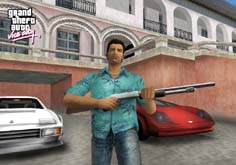NEW YORK (CNN/Money) - A federal appeals court gave the video game industry a big boost Tuesday, reversing a controversial lower court decision and ruling that games are protected by the First Amendment.
Last April, Senior U.S. District Judge Stephen Limbaugh ruled that computer and video games had "no conveyance of ideas, expression or anything else that could possibly amount to free speech" in a St. Louis County case that sought to limit children's access to mature video games.
The 8th U.S. Circuit Court of Appeals disagreed, saying a "particularized message" is not required when it comes to the First Amendment.
"If the First Amendment is versatile enough to 'shield [the] painting of Jackson Pollock, music of Arnold Schoenberg, or Jabberwocky verse of Lewis Carroll,' we see no reason why the pictures, graphic design, concept art, sounds, music, stories, and narrative present in video games are not entitled to a similar protection," the court said in its ruling. "The mere fact that they appear in a novel medium is of no legal consequence."
 |
|
| Tuesday's ruling means games such as "Grand Theft Auto" are protected by the First Amendment. |
St. Louis County had argued that stories are incidental in games, and players often skip straight to the action. The court acknowledged this, but noted the same could be said of today's action-packed movies, such as "The Matrix." Additionally, it said, home viewers of these films can easily skip to the action sequences using their DVD players or VCRs.
"The fact that modern technology has increased viewer control does not render movies unprotected by the First Amendment, and equivalent player control likewise should not automatically disqualify modern video games," the court said.
Experts say the ruling could have broad implications. Specifically, it could be a key factor in the upcoming appeal of Washington state's recently signed law banning the sale of certain violent video games to people under the age of 17.
| RELATED STORIES
|

|
|
|
|
"There's a lot in here that spells doom to that Washington law," said Damon Watson, an attorney who focuses on the video game and interactive entertainment industry for Bryan Cave LLP in Los Angeles. "The court's really putting lawmakers on notice that you can't say there's a problem without really backing it up."
Specifically, the ruling said the County "must come forward with empirical support for its belief that 'violent' video games cause psychological harm to minors" before restricting access to those games. St. Louis attempted to make that argument even bringing in a psychologist to testify during the hearing. The court rejected this theory, though, saying it was "simply unsupported in the record" and lambasted the "vague generality" of the psychologist's testimony.
The gaming industry cheered the court ruling.
"Better late than never," said Doug Lowenstein, president of the Interactive Digital Software Association (the gaming industry trade group). "The decision sends a powerful signal to government at all levels that efforts to regulate consumers' access to the creative and expressive content found in video games will not be tolerated."
Tuesday's ruling probably won't have a dramatic effect on video game stocks, even those publishers who specialize in action titles, such as Take Two Interactive Software, said analysts.
"Anytime one of these [lawsuits] comes up, it's something the short community has tried to use to scare people, but most fundamental investors aren't that worried about this issue," said Stewart Halpern, managing director and analyst for RBC Capital Markets. "Because most [investors] are sophisticated enough to know that it would be really hard to implement any sort of meaningful restrictions on these companies."

|

